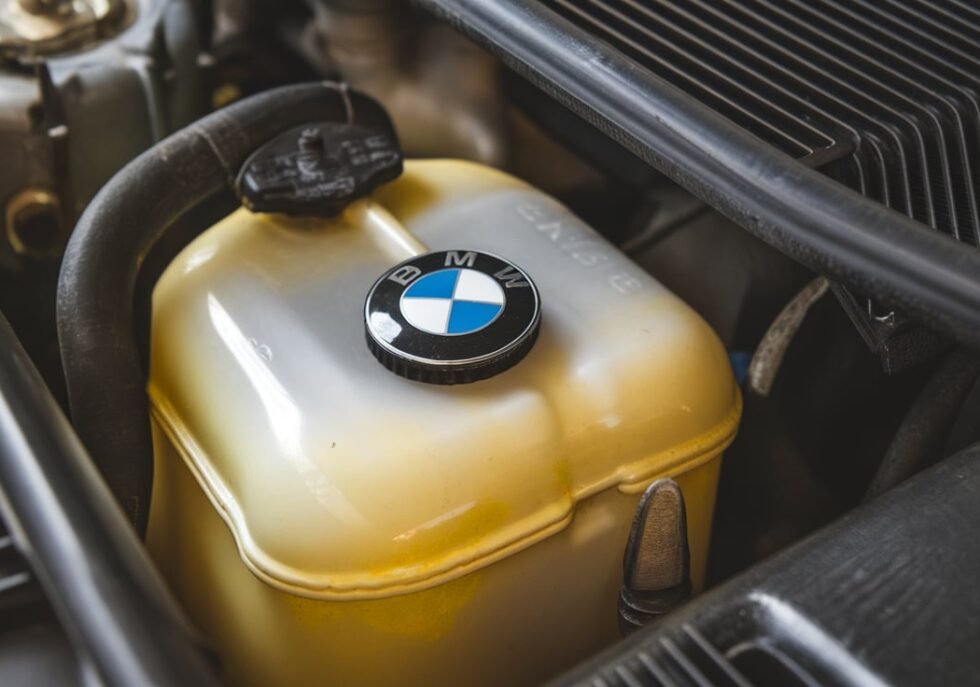
BMW Oil Consumption|How Much Is Normal in the UAE?
You just topped up the oil last week, right? Then why is your BMW asking for more again? That little warning light on your dash or the dipstick showing a drop, it stirs up worry. In the UAE’s traffic, with scorching heat and turbo engines under pressure, many BMW drivers quietly ask themselves: Is my engine burning too much oil? Or is this just… normal? Let us be clear, BMW oil consumption can vary wildly. Some engines sip a little between oil changes. Others? They guzzle like they are on a desert rally.
But here’s the thing, in Dubai, what counts as “normal” changes. Extreme temperatures, highway-to-traffic transitions, and engine strain all play a role. And no, topping off every 1,000 miles is not always a sign of a failing engine… but sometimes, it is. Tip: If you are adding more than 1 liter every 1,000 miles, it is worth inspecting the PCV system, valve seals, and piston rings, especially in turbocharged models. This guide breaks it all down. From factory specs to Dubai-specific issues, we will walk you through how much BMW oil consumption is normal, when to worry, and what real repairs look like, right here in the UAE.
What Is “Normal” BMW Oil Consumption? | Understanding the Limits
You hear it all the time, “It’s normal for BMWs to burn oil.” But what does normal mean? A few drops? A liter? Every 500 miles? Here’s the uncomfortable truth: BMW oil consumption is expected by the manufacturer, but the “acceptable range” might surprise you. BMW’s own documentation claims that up to 1 liter every 1,000 miles can still fall within factory tolerance. Sounds a bit much, right? Especially when you have just paid for an oil service and suddenly, you are reaching for a bottle every few weeks. But it depends on a few important variables:
- Engine model and age | Older engines like the N52 or N63 tend to burn more
- Driving conditions | Long cruises vs. stop-start city traffic in Dubai
- Oil type and quality | Thin oils evaporate faster under high load
- Maintenance history | Long oil intervals cause premature seal wear
And while 1 liter every 1,000 miles may be “within spec,” that does not mean it should be ignored. Consistent topping-up may signal early wear in valve stem seals, piston rings, or crankcase ventilation systems. So yes, some BMW oil consumption is expected. But tracking how fast it drops, and under what conditions, is key. Because once it passes that “normal” line, things can escalate quickly.
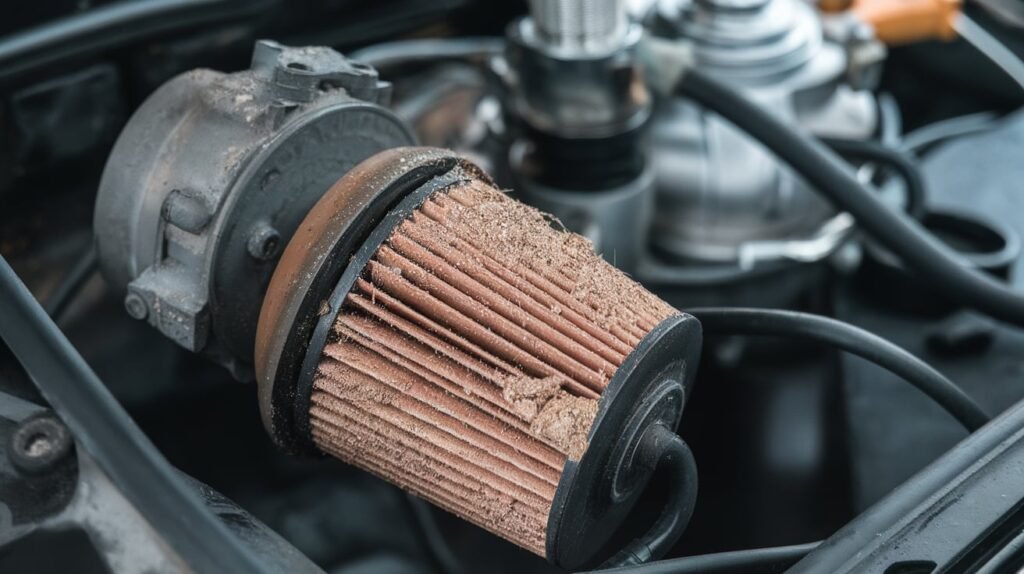
What’s Considered “Normal” vs. Excessive Oil Consumption?
BMW engines are known to consume oil, but how much is too much?
- Normal Range: Up to 1 liter every 1,500–2,000 km is considered acceptable by BMW, especially for high-performance engines.
- Excessive Consumption: Anything beyond 1 liter per 1,000 km may indicate a mechanical issue.
- BMW’s Official Guidance: Some models have Technical Service Bulletins (TSBs) acknowledging oil consumption as a design trait, not a defect.
👉 Tip: Always monitor oil levels via iDrive or dipstick every 1,000 km, especially in Dubai’s extreme conditions.
BMW Engines Known for High Oil Consumption
Not all BMWs are created equal when it comes to oil usage. Here are the usual suspects:
| Engine Code | Models Affected | Common Issue |
|---|---|---|
| N20/N26 | 3 Series, 5 Series | Turbo seal leaks, PCV failure |
| N52/N54 | Older 6-cylinders | Valve stem seal wear |
| N63/N62 | X5, 7 Series V8s | Piston ring blow-by, valve seals |
| B48/B58 | Newer models | Generally improved, but still monitor |
🛠️ Dubai Tip: Turbocharged engines suffer more in high heat—watch for oil smoke on startup or acceleration.
Why BMWs Consume More Oil in the UAE | The Harsh Reality of Local Driving?
Let us not sugarcoat it, BMW oil consumption is a different beast in Dubai. The same engine that runs smoothly in Europe might start guzzling oil like water under the UAE sun. Why? Because this environment is brutal. Long hours in stop-and-go Sheikh Zayed traffic, desert temperatures soaring past 110°F, and the pressure of turbochargers working overtime, all these stress your engine in ways you do not see on paper. Here is why oil consumption spikes in Dubai’s conditions:
- Extreme ambient heat | Oil thins out faster, increasing evaporation and seepage
- Turbocharged engine stress | Boost builds pressure, and that pressure finds the weakest seals
- Idling in traffic | Constant low-RPM operation worsens blow-by and oil misting
- Dust and air quality | More contaminants = higher crankcase pressure = oil push-out
Some BMW models, like the N63 twin-turbo V8, already have a reputation for oil thirst. Throw in Dubai’s conditions, and the numbers can climb fast. Even the relatively efficient B48 4-cylinder turbo shows increased oil loss during the summer. BMW oil consumption in Dubai is not just about how the engine was built; it is also about where it is running. So when your engine asks for another top-up, it might not be broken; it might just be sweating in the heat, just like you.
Technical Causes of Excessive Oil Consumption
If your BMW is guzzling oil, here’s what might be going wrong under the hood:
- Piston Ring Wear: Allows oil to seep into the combustion chamber.
- Valve Stem Seal Degradation: Common in older engines; leads to oil burning during deceleration.
- PCV System Failure: Pressure control valve issues cause oil mist to enter the intake.
- Turbocharger Oil Seal Leaks: Especially in N20/N26 engines, oil enters the intercooler and burns off.
- Oil Grade Mismatch: Using non-BMW-approved oil can accelerate breakdown and consumption.
Diagnostic Tip: A compression test or borescope inspection can pinpoint internal oil loss.
BMW Engines Known for Oil Consumption | Models That Demand Closer Watch
Not all BMW engines are created equal. Some sip oil politely. Others? They drink it like it is fuel. If you drive one of the engines listed below, chances are you have already topped off mid-service. But the question is, how much is too much? And what should you expect here in Dubai? Below are some common BMW engines known to show higher-than-average oil usage, especially in UAE driving conditions:
- N20 & N26 4-Cylinder Turbos
Light, peppy, and turbocharged, but known for PCV system issues that cause crankcase pressure buildup. Oil misting and seepage around the valve cover are common. - N52 6-Cylinder Naturally Aspirated
Loved for reliability, but valve stem seal wear becomes a problem after 100,000 miles. Oil sneaks past into the combustion chamber. - N63 V8 Twin-Turbo
One of the most oil-hungry engines BMW ever produced. Valve seals, turbos, and even piston rings have caused oil loss complaints, especially in high-heat environments like Dubai. - B48/B58 Modular Engines
Modern and efficient, but turbo heat and long service intervals still push oil usage. If neglected, PCV valve clogging can lead to increased pressure and oil vapor release.
Fact: The N63 was the subject of multiple BMW technical service bulletins (TSBs) due to excessive oil consumption, leading to recalls and extended warranties in some regions.
Even if you are driving a newer 3 Series or X5, BMW oil consumption might show up earlier than expected, especially with low-viscosity oil grades and long traffic jams. Knowing your engine code is not just for enthusiasts anymore. It helps you understand what to expect, and more importantly, what to keep an eye on.
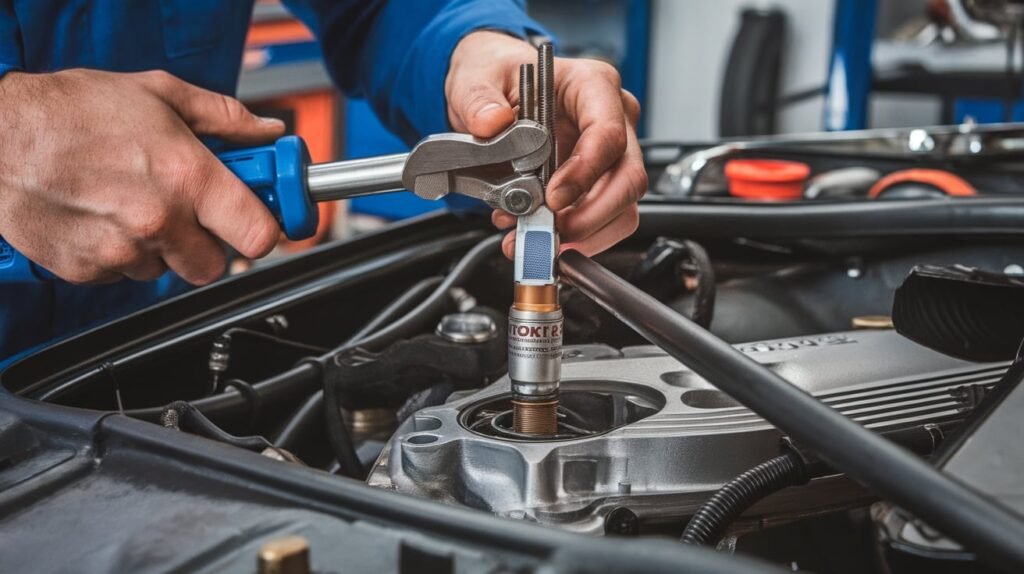
Dubai-Specific Factors That Accelerate Oil Consumption
Dubai’s climate isn’t just tough on paint, it’s brutal on engine oil.
- Extreme Heat: Oil thins out faster, reducing its protective properties.
- Long Idling: Common in traffic or valet queues; increases oil vaporization.
- Dust & Sand: Contaminates oil, especially if air filters aren’t changed regularly.
- Aggressive Driving: High RPMs and turbo boost increase oil pressure and consumption.
🛡️ Preventive Tip: Use LL-01 or LL-04 BMW-approved synthetic oils with high thermal stability.
Oil Grade, Viscosity & Service Intervals in the UAE | Why Do They Matter More Than You Think?
You followed the schedule. You used synthetic oil. So why is your BMW oil consumption still spiking? The answer might be in the oil itself, not just how much you add, but what kind you are adding. Dubai’s heat does not play fair with engine oil. When temperatures stay high for long stretches, lower-viscosity oils (like 0W-30 or 5W-30) can break down faster, thin out, and escape through seals and valves more easily. Let us break it down:
- Low-viscosity oils = higher evaporation risk
In desert climates, thinner oils can become too light under stress, slipping past piston rings and valve seals. - High-performance engines need stronger protection
Turbocharged BMW engines run hotter by design. The oil not only lubricates but also cools internal components. When it thins, everything runs hotter. - Extended service intervals can backfire
BMW recommends oil changes every 10,000 miles (or even more). In Dubai? That is asking for trouble. The oil often degrades faster than expected.
If your BMW sees highway speeds, high revs, and long idle times, standard European service intervals are not always enough. BMW oil consumption increases sharply when degraded oil can no longer protect seals and rings. And if you are using dealership-recommended oil without accounting for Dubai’s climate? You may unknowingly be speeding up the very problem you are trying to avoid.
Real BMW Oil Consumption Cases | What We See in Dubai Every Week
It is one thing to read specs and theories, and another to deal with it under the hood. Here in Dubai, we do not guess what causes BMW oil consumption; we see it, measure it, fix it. These are not hypotheticals. These are real cars from real customers, rolling into our workshop with the same question: “Why does my BMW keep asking for oil?” Let us walk you through a few cases that say more than any manual can.
Case 1 | BMW 320i B48 Engine
- Mileage: 52,000 miles
- Complaint: Oil level warning every 900 miles
- Findings: PCV valve partially clogged, light seepage around valve cover gasket
- Solution: Replaced PCV assembly, switched to higher-viscosity 5W-40 oil
- Outcome: Oil top-ups extended to every 3,000 miles
Story: The customer assumed the engine was “just thirsty.” But the problem was building quietly. One valve fix saved a lot of future headaches.
Case 2 | BMW X5 with N63 Twin-Turbo V8
- Mileage: 81,000 miles
- Complaint: Visible smoke on start-up, burning 1.5 liters every 800 miles
- Findings: Worn valve stem seals + early piston ring wear
- Solution: Top engine rebuild, stem seal replacement, ring inspection
- Outcome: Oil loss dropped to 0.3 liters per 1,000 miles
Quote from the technician: “In this heat, those seals do not stand a chance after 70k. But many owners keep topping up until the real damage begins.”
Case 3 | BMW 118i with N13 Engine
- Mileage: 44,000 miles
- Complaint: Oil smell in the cabin, but no warning lights
- Findings: Oil seeping into the exhaust manifold, slight leak around the turbo oil line
- Solution: Turbo oil feed gasket replaced, cabin filter replaced
- Outcome: Smell gone, no further oil loss in 2,000+ miles
Tip: Sometimes BMW oil consumption does not show on the dash; it shows in your nose. That smell? It is the oil burning before you ever see it. Need expert help before oil loss turns serious? Visit BMW Garage Dubai for a full oil-consumption diagnostic and pressure test. Our technicians specialize in Dubai-specific engine care, from PCV replacement to turbo seal restoration.
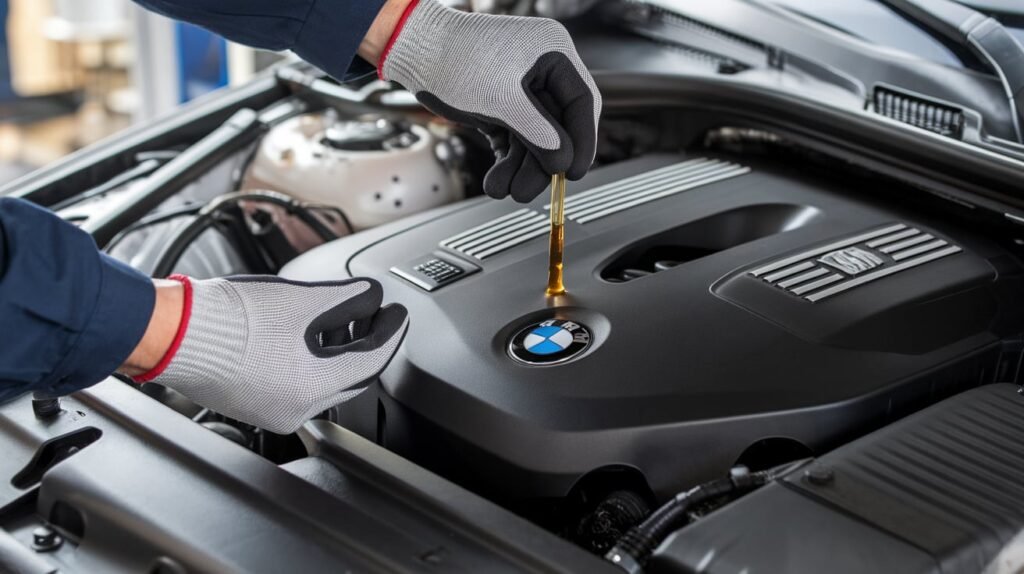
How to Prevent Excessive BMW Oil Consumption | Dubai Drivers, Take Note
You know the drill by now. The oil light flashes. You add a liter. A few hundred miles later, same story. But what if that cycle could be stopped before it starts? The truth is, BMW oil consumption does not always begin with a failure. Often, it creeps up, slowly, silently, through habits, environment, and overlooked details. Prevention is not just possible, it is essential, especially here in Dubai, where engines face year-round punishment. Here is what we tell our customers, not to fix a problem, but to avoid one:
✅ Stick to 5,000–6,000-mile oil intervals
Manufacturer schedules are made for Europe, not for UAE heat. Long gaps between oil changes cause breakdown in viscosity and buildup of sludge that damages seals.
✅ Choose higher-viscosity oil
For many engines, 5W-40 or 10W-40 oil offers better resistance against thermal breakdown. It stays thicker when hot, which means less evaporation, less seepage. You can also cross-check the signs covered in our BMW problems guide, small oil leaks often show up alongside vibration, overheating, or burning-smell complaints.
✅ Inspect the PCV system yearly
PCV valves and oil separators clog frequently in turbocharged BMWs. A stuck valve = higher crankcase pressure = oil pushed through weak points.
✅ Clean the oil breather hose and check the valve cover gasket
These two often show early signs of leaks — especially on engines like the N20 and B48.
✅ Warm up before pushing the throttle
Flooring the accelerator on a cold engine sends oil pressure spiking through unlubricated seals. Be patient, let the oil circulate.
Fact: Oil consumption rarely starts suddenly. It builds over months, through old oil, heat damage, weak seals, or just one skipped inspection.
Small changes = big differences. If you are topping off oil every few weeks, ask yourself this: Have I been treating the oil as an afterthought? A few smart habits can delay major repairs. And if BMW’s oil consumption has already begun? Catch it early. Because once seals wear and rings scar, there is no going back, only a much bigger bill ahead.
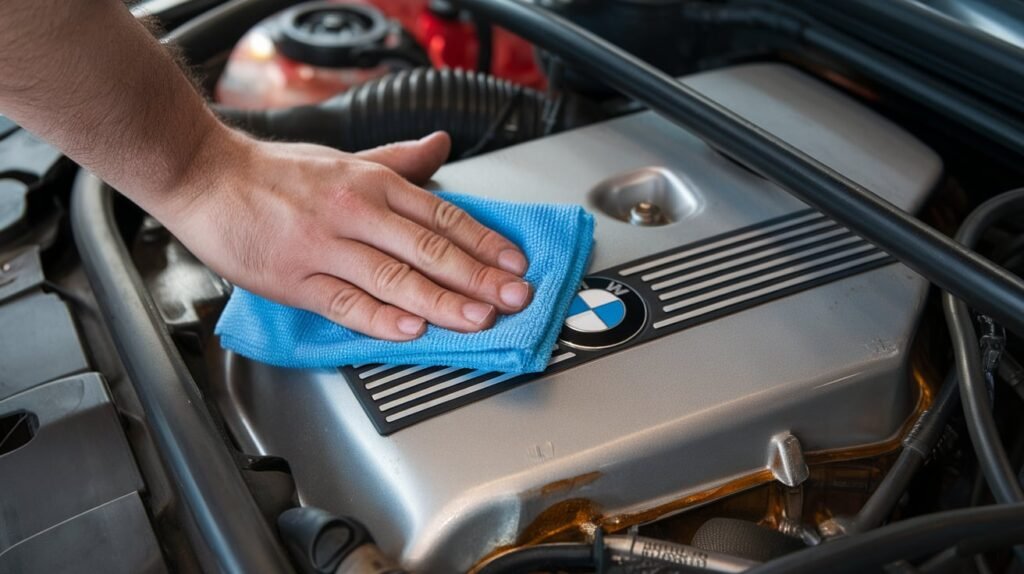
How BMW Garages Diagnose Oil Consumption Issues | What Happens Behind the Scenes?
You hand over your BMW keys, worried. You have topped off oil twice this month, and something just feels off. But what happens next? What do mechanics do when you say your car is drinking oil faster than it should? Let’s pull back the curtain. Diagnosing BMW oil consumption is not about guessing. It is a process, part technical, part experience, and a whole lot of paying attention to small signs most drivers miss. Here is how a proper garage in Dubai approaches it:
Checklist for Diagnosing BMW Oil Loss
- Check oil levels + track consumption: Not just a dipstick check. The tech logs oil loss vs. miles driven. If you’re losing more than 1 liter every 1,000 miles, it is flagged.
- Valve cover & gasket inspection
On engines like the N20 or N52, these gaskets crack silently over time. Leaks start slowly, often hidden near the firewall. - PCV valve and crankcase ventilation test: A clogged PCV system builds internal pressure. That pressure forces oil past seals. Most people never think to look here first, but pros do.
- Turbo seals & piston rings observation: Especially on high-mileage or turbocharged engines, oil may be disappearing into the combustion chamber. A compression test or leak-down test can confirm ring wear.
- Oil separator check: Located near or within the valve cover, this part traps oil vapors. If it fails, it sucks oil straight into the intake.
Tip: If the garage does not bring up crankcase pressure or PCV diagnostics, ask them why. In 40% of BMW oil issues we see, it starts right there.
Oil does not always leave a puddle behind. In Dubai, with high engine bay temps and long idle hours, oil can vanish into places you never notice, until your engine starts misfiring or smoking. A real inspection? It is not about “fixing” first. It is about knowing where to look.
Cost Estimates & Service Options in Dubai
Here’s what BMW owners can expect when addressing oil consumption issues:
| Service Type | Estimated Cost (AED) | Notes |
|---|---|---|
| Oil Diagnostics | 250–400 | Includes leak check, PCV test |
| Valve Stem Seal Replacement | 2,500–4,000 | Labor-intensive; common fix |
| Turbo Seal Repair | 1,800–3,000 | May require turbo rebuild |
| PCV System Replacement | 600–1,200 | Quick fix for many oil issues |
Book your BMW oil check today and get a free PCV system inspection.
Still Topping Off Oil? | It Might Be Time to Ask Why
You are not imagining it. Your BMW should not need a fresh liter every few hundred miles. And while some BMW oil consumption is normal, especially in Dubai’s heat, consistent top-ups, strange smells, or creeping oil loss are worth a second look. Catching the issue early could mean the difference between a quick fix and a full engine teardown. We see it every day, smart drivers walking in with simple concerns that turn out to be real problems hiding beneath the surface.
Tip: The earlier you track your oil loss and log the miles, the easier it is for technicians to pinpoint the cause without guesswork.
If you are feeling unsure, it is okay. Let us take a proper look, not a glance. Our team knows these engines inside out, and we diagnose based on Dubai’s unique conditions, not just what’s in the manual. Book an inspection today, or just bring your BMW in for a check. We will go step-by-step, no pressure, no upsell. Just real answers for your peace of mind.

